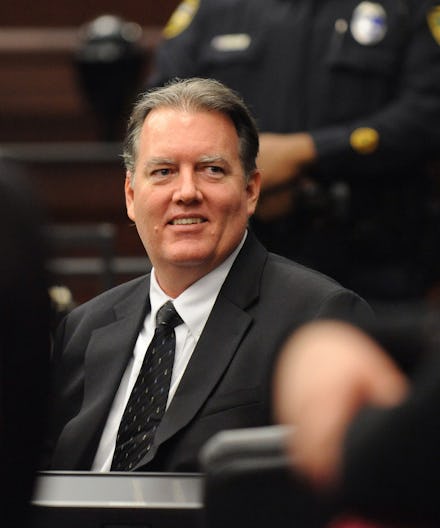Jordan Davis Was Killed Because of America's Fear of Young Black Men

In November 2012, Michael Dunn, a 47-year-old white male stopped at a local gas station in Jacksonville, Fla. with his then-fiancée. When he pulled up at the gas station parking lot, he parked next to a car full of young, black male teens playing loud music. In the backseat of the car of teens was Jordan Davis, a 17-year-old from Marietta, Ga.
Dunn apparently asked the teens to turn down their music. A verbal altercation ensued between Dunn and Davis. According to Dunn, Davis pulled out some object that appeared to be a shotgun. Dunn pulled his 9mm gun out of his glove compartment and fired eight or nine times into the car full of young teens. Jordan Davis was killed. Police never found any gun or object that Davis could possibly have used that Dunn would have mistaken for a gun.
Dunn left the scene of the shooting, went back to his hotel with his fiancée and ordered pizza. He never called the police.
Based on these facts, why couldn't a diverse jury find Dunn guilty of murder (rather than attempted murder)? The answer is simple: The law of self-defense in Florida does not require an individual to flee to avoid using lethal force. And, at least two Florida juries have interpreted the law to mean that anytime a young black male is present, the "reasonable fear" requirement (that allows a person to use lethal force) is satisfied.
On the first issue, the requirement to flee, if possible, is one that was embedded into the law of self-defense when it was developed centuries ago, except in certain circumstances, namely when in defense of one's own home. To law students, this is known as the castle doctrine, with the underlying idea being that a person has a right to defend his or her castle/home/property. Florida and several other states have extended the castle doctrine far beyond its initial use and have effectively made it permissible for an individual to defend herself instead of fleeing in any and every circumstance. This is slightly different from the "Stand Your Ground" law, but only as a matter of procedure.
Neither Michael Dunn nor George Zimmerman used the Florida "Stand Your Ground" law, in that they did not request a special pre-trial hearing by the judge to determine if they actually stood their ground according to the law. Dunn and Zimmerman used the stand your ground principle that changed the dynamics of self-defense law in Florida. It is this shift in principle that makes it okay for Dunn to raise a self-defense claim when he could have simply pulled out of the parking lot, and for Zimmerman to raise a self-defense claim when he could have simply stayed in his vehicle as told by officers.
The second fundamental issue is even more disturbing. It is not based on an actual shift in law as enacted by the Florida state legislature, but rather is based on an interpretation of "reasonable apprehension" that brings to bear all of the fears of young black men that are inculcated into society through media, "news" and political fearmongering.
The question before the jury was whether it was reasonable for Dunn to fear for his life when he thought he saw something that could have been a gun (although no gun was recovered and no object similar to a gun could be found) coming through the back window of a car filled with four young black men listening to loud "thug" music or "rap crap?" For some members of the jury, the answer to this question was "yes," and for others the answer was "no."
When jury members start to do television interviews, I would not be surprised if we find that it was the non-white jurors who answered "no" and the white jurors that answered "yes." But why am I making this racial? Isn't this just playing into the same ol' racial infighting that we should be past in a post-racial America? My answer is no. Why? Because if four white teens bumping rock music had pulled up to Dunn, I believe that regardless of a phantom gun, those four kids would still be alive today. And, if one of them had been killed, a jury would have found Dunn's apprehension unreasonable.
This is a tough pill to swallow, but as a society, we have demonized young black men so much, for so long, that it is ingrained into our national psychology. It is easier for a jury to simply throw up their hands in irreconcilable disagreement than to find a middle-aged white man's fear of a young black man, in the absence of an actual weapon, unreasonable. I am frustrated by the fact that a jury has failed to hold accountable someone with the ability to do one simple thing: walk (or in this case, drive) away.
Dunn spoke to the teens first. He pulled out his gun, fired about eight shots into a car full of young teens, went to his hotel and ordered pizza instead of calling police, and for now, Dunn remains unaccountable for the murder of Jordan Davis.
So what now? How do we move forward? As I see it, there two options: one that is difficult but possible, and one that seems out-of-reach. First, we must push states like Florida to reinstate a common law definition of the castle doctrine, meaning that the only time you have a right not to flee, if possible, is when you are in your own home. Second, we must deprogram our society's fear of young black men. On the second issue, I welcome any and all suggestions, as I fear it may be an insurmountable task.